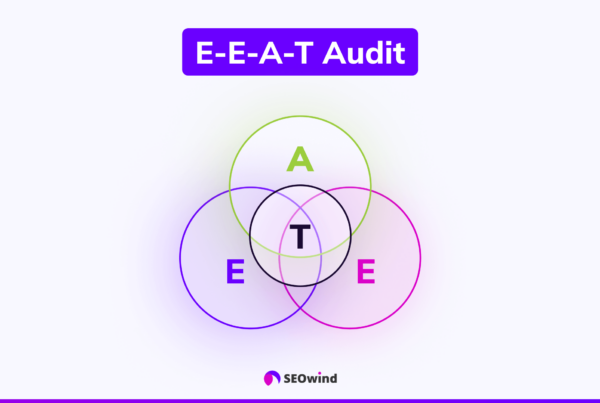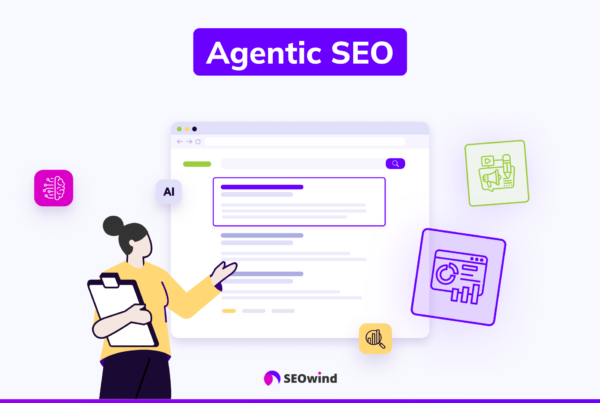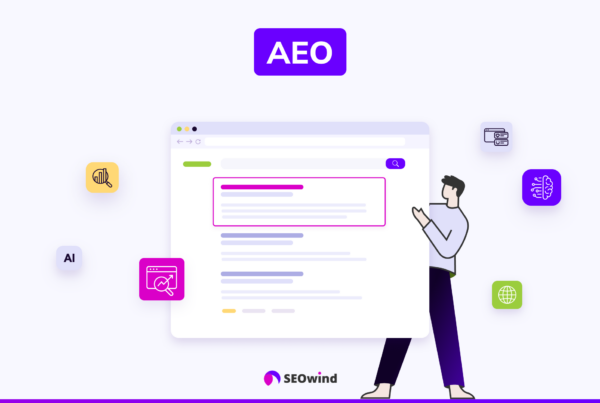You likely have heard of search engine optimization (SEO). Some swear by its ability to rocket businesses to new heights, while others express bewilderment or skepticism. This guide will equip you with essential insights about SEO, dig into its relevancy, and, most importantly, answer the question, “Is SEO worth it?”
What Is SEO and How Does It Work?
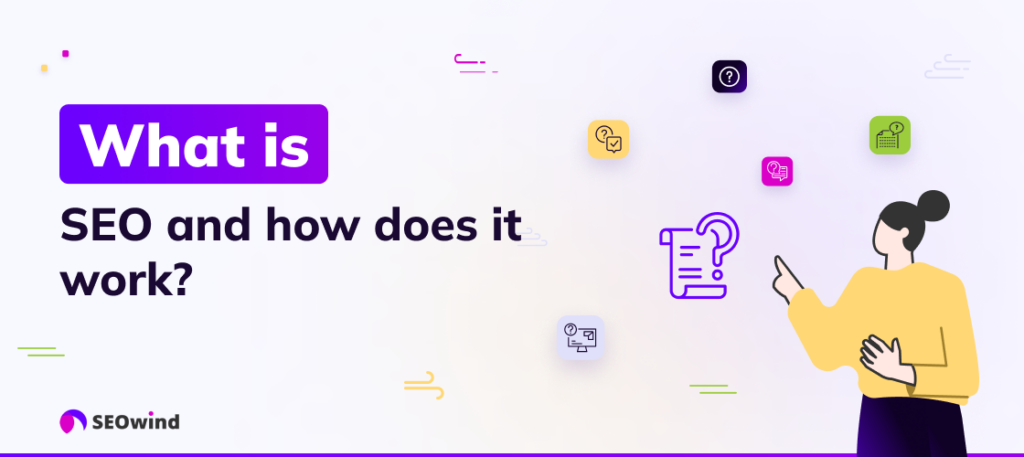
SEO is a range of techniques website owners use to enhance their visibility on search engine results pages (SERP) through organic means and without paid advertising.
Here’s how it works: when someone types a query into a search engine such as Google or Bing, an algorithm sifts through billions of pages in its database to find the most relevant answers. Your website’s goal is to appear among the top-ranking search results, preferably at position one or on the first page where potential customers are likely to click.
However, achieving these coveted positions doesn’t happen by chance. It takes deliberate planning backed by effective SEO strategies adapted to constant search algorithm updates. This process involves optimizing critical elements, from content creation with targeted keywords catering to user intent to ensuring strong linking patterns and fast loading times.
In essence, winning in today’s SERPs goes beyond improving visibility. It’s about providing high-quality, responsive web experiences that users love! This is why SEO must be a key consideration from the moment you start building your online presence.
Why SEO Is More Relevant Than Ever in 2024
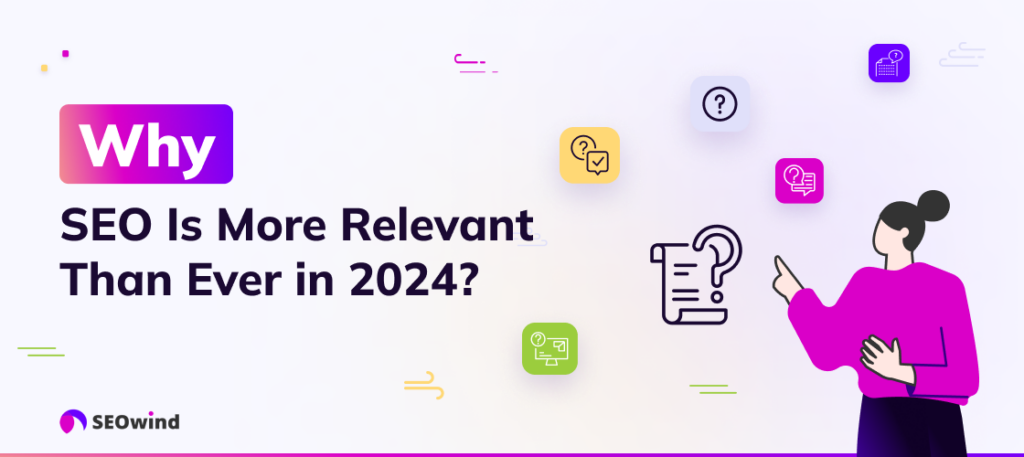
The Internet continuously shapes how consumers gather information and make purchasing decisions. It is even more vital for businesses, big or small, to be visible where their potential customers are: online.
In 2024, SEO has retained its relevance and become increasingly essential due to persistent shifts in consumer behavior and search engine algorithms.
According to Internet Live Stats, Google processes around 40,000 queries every second. What’s striking is that only 0.63% of users click on a link they find on the second results page [Source: Internet Live Stats]. This means ranking higher on Google equates to greater brand recognition by your target audience.
Furthermore, Google handles approximately 80 billion visits each month! Interestingly enough, about 65% of all organic clicks belong to one of the top three results. Such statistics quantitatively demonstrate why you must pay attention to current trends and behaviors.
If you’re not focusing on improving your company’s online presence through effective SEO strategies in 2024 and beyond, you risk falling behind competitors who have embraced this form of marketing wholeheartedly!
With continual advancements in technology like AI, conventional keyword stuffing practices no longer rule the SEO world as they did earlier.
The information age, fueled by our urge for convenience, has made people more connected than ever; we use keywords or pose questions, making searches conversational while searching for a product or service. As a result, SEO in 2024 and beyond involves context-driven search optimization and emphasizes the creation of meaningful content to match specific user needs.
SEO is no longer just about achieving the top spot on Google. It’s more oriented to building trustworthy relationships with consumers through answering their queries and providing value in your offerings. After all, even if you fall slightly short of reaching that coveted first-page rank, your brand could still gain leverage from organic traffic.
Analyzing the True Value of SEO for Businesses
In this world driven by digital, it’s crystal clear that every business – big or small – needs a functional website. Unfortunately, having a functioning site is not sufficient in itself. That’s where SEO works as a magic tool to make your existence seen and felt in the vast territory we call the Internet.
What does SEO mean for businesses? At its heart, SEO boosts your website’s visibility on search engines, ensuring your business shines when appropriate keywords are typed into search engines like Google.
Now, how does increased visibility translate into value for businesses?
- Enhanced discoverability: With proper SEO measures, consumers find you instead of you reaching out to competitors.
- Continuous traffic: Compared to traditional methods such as advertisements, which occasionally run dry, SEO generates organic traffic around the clock.
- Credibility and Trustworthiness: A high ranking on SERPs positions your brand as reputable and trustworthy in consumers’ eyes.
- Targeting High-Quality Traffic: One distinct advantage of SEO lies in its inbound nature, meaning it targets users already actively looking for the kind of products or services you offer.
Case Studies: How SEO Has Transformed Businesses
To better illustrate how this seemingly intricate process could add so much value for organizations, let’s consider real-life examples where embracing smart SEO strategies catapulted companies to success beyond what they could have anticipated.
Case Study 1: Canva
Canva, a graphic design platform, started focusing heavily on its SEO strategy early on. The company created an extensive list of keyword-specific landing pages targeting different segments around the world. Canva also nurtured a partner and affiliate network to expand its reach further. As a result, Canva’s organic search traffic on their Design School blog increased by 226% in just 60 days.
Case Study 2: Airbnb
Airbnb, one of the biggest online lodging marketplaces, leveraged SEO tactics to survive and thrive amidst fierce competition from traditional hospitality sector giants. By optimizing its site architecture and refining its content strategy with targeted keywords, it experienced exponential growth in organic traffic.
Such success stories demonstrate how effective SEO practices make businesses more visible, credible, attractive, and ultimately lucrative online. It’s no longer about whether you should invest in SEO; it’s more about “How robust of an SEO strategy do you need?”
SEO Myths and Misconceptions

Navigating the SEO maze can seem daunting if you’re new or not a professional in the field. Several myths and misconceptions can misinform and subsequently lead businesses to less-than-optimal outcomes.
SEO changes too frequently; it’s impossible to keep up
Indeed, Google does update its algorithm regularly, sometimes daily. But you don’t need to panic! The essential principles remain constant: create high-quality content aimed at your target audience’s interests, use relevant keywords naturally within said content, and develop an effective backlink strategy. Yes, important updates should be noted when they occur, but the dynamic nature of SEO means that keeping up is far from impossible. Being adaptive is king!
Keyword stuffing boosts ranks
Once upon a time in the early days of SEO, this myth reigned supreme: you could cram numerous targeted keywords into your content and skyrocket to the top of SERPs. However, rest assured that this practice isn’t valid anymore. In fact, Google frowned upon such behavior because it led to a poor user experience. Instead of keyword stuffing, use a mix of primary and Latent Semantic Indexing (LSIs) keywords judiciously sprinkled throughout organic content.
SEO results are instantaneous
It would be delightful if our actions always provided immediate gratification, but that isn’t the case for many things worth doing, SEO included! SEO takes time because its ultimate goal is building credibility with search engines. This endeavor cannot be achieved overnight. So, patience remains critical! Remember that Rome wasn’t built in a day? Think of growing your site’s profile as constructing your version of Rome; laying each brick carefully will eventually lead to substantial gains.
Quality Content without SEO works just fine
Unquestionably, quality content is vital. Without it, your visitors bounce back as fast as they came. However, SEO functions as the road that leads users to this stellar content you’ve created. Without desirability in the eyes of search engines, your fabulous content may sit alone and undiscovered in obscurity, a diamond buried out of sight. Thus, quality content and effective SEO need to be inseparable allies.
Local Businesses don’t benefit from SEO
Please permit me to break through this misconception with a sledgehammer! Local businesses most certainly benefit from localized SEO initiatives. By optimizing for local search results, a local business obtains better online exposure within its community niche. If people can’t find your pizza place when they google “best pizza near me,” how will you entice them to walk through those doors or click on your delivery app? Always remember: visibility leads to opportunity.
By debunking these common misconceptions about SEO, we hope to shed some light on the essence of an effective strategy: focus on quality content, fit your messaging to relevant searcher intent keywords, and optimize intelligently for user experience stability.
Measuring the Return on Investment (ROI) of SEO
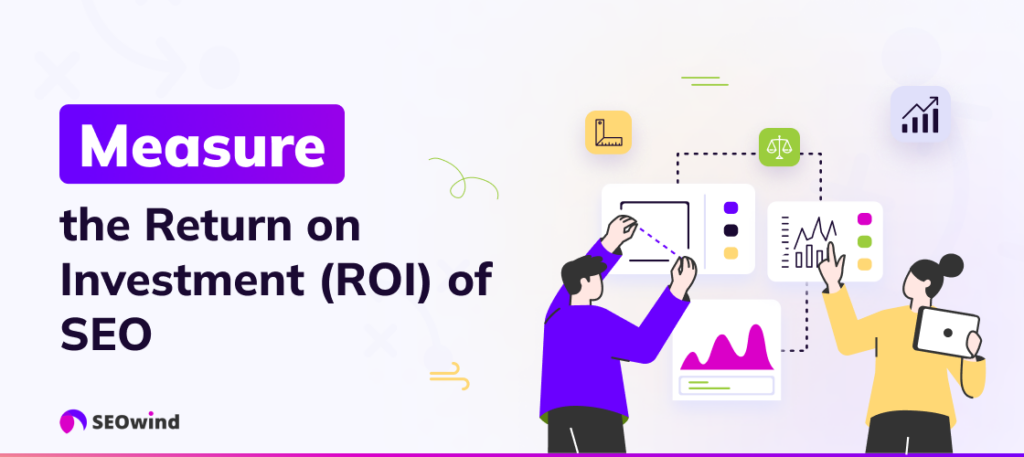
Comprehending SEO’s financial benefits involves examining it through the lens of return on investment (ROI). Simply put, you compare the money you spend on optimizing your site to the potential profit gains. If your profits significantly outweigh your expenditure, then SEO warrants its purpose.
Cost VS Gain: The Economic Perspective of SEO
From an economic perspective, it’s crucial to note that actual spending on SEO varies widely based on several factors, such as:
- The competitiveness of your industry.
- Where your website currently stands in terms of optimization.
- The skills and expertise level required.
While these costs can amount to a significant sum for comprehensive strategic campaigns, it’s also worth considering what you stand to gain:
- increased organic website traffic,
- better visibility on search engines like Google and Bing,
- an enhanced user experience, and, in turn,
- greater customer conversion rates, leading to amplified profits over time.
Concentrating strictly on figures might be misleading because a successful marketing strategy goes beyond direct monetary returns. There are also intangible benefits like improved brand recognition and credibility.
When to Expect Visible Results from SEO Efforts
Getting substantial results with SEO takes time and effort. It’s often a long haul that may take 6 months to a year to get the full results. Still, some SEO quick wins should be available right away.
In contrast to paid advertising campaigns that deliver almost immediate but short-term results, dedicated SEO efforts yield more sustainable outcomes. Although demanding patience for substantial progress may seem laborious, investing time into this sort of methodical growth might provide unprecedented value when compounded sustainably.
Remember that patient consistency yields genuine dividends. It’s not easy, but the rewards can be significant.
The Role of SEO in Building Brand Awareness and Credibility
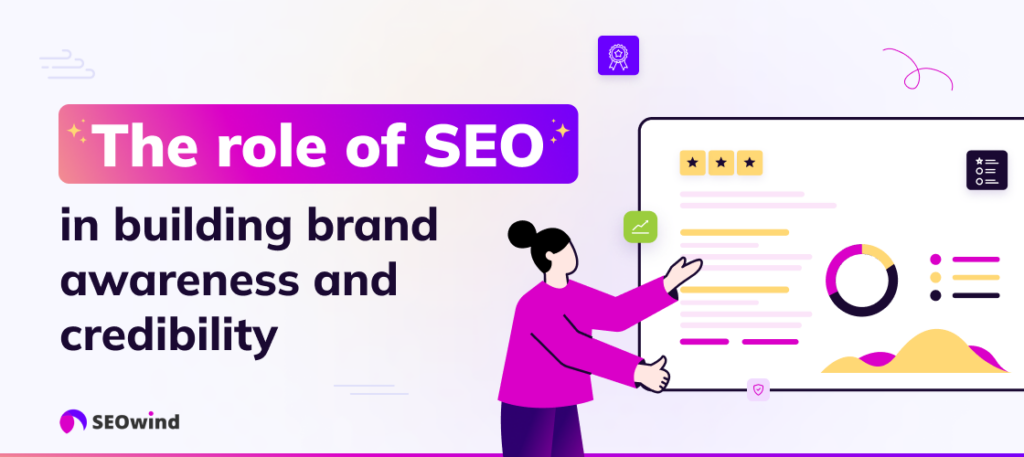
While some view SEO as a purely tactical tool for better page ranking, its role extends beyond this simplistic outlook. Believe it or not, SEO plays a monumental part in the construction of your brand’s awareness and credibility.
How Improved Visibility Influences Brand Perception
By optimizing your website to appear on the first page of SERPs – and ideally among the top three – you automatically increase potential interactions with users searching for topics relevant to your business.
Increased visibility doesn’t merely lead to more clicks; it dictates how audiences perceive your brand. Businesses that rank high are generally perceived as authoritative, trustworthy, and leading in their respective fields, characteristics that consumers naturally trust. Conversely, brands at the bottom or on subsequent pages may be seen as less reputable.
However visually stimulating your site might be, it simply becomes insignificant if it isn’t visible.
Establishing Thought Leadership Through Content Optimization
Creating valuable content is critical for SEO and, when done right, offers benefits that stretch far beyond SERPs. In fact, an effective content strategy helps cement you within your industry as a thought leader and a trusted source of knowledge and advice.
Optimizing blog content with keywords that resonate with your audience propels you into their circle of trust. Users who consistently find meaningful answers to their queries through your articles will naturally think of you as an expert voice in that field. As they share these informative posts with peers within their networks, you’ll have opened gates to countless people unaware of your existence previously!
Thought leadership does not materialize overnight. Instead, it’s cultivated slowly but surely by producing compelling and optimized content regularly and engaging proactively with audiences.
Comparative Analysis: PPC Spend vs. Organic Traffic Value
Let’s ponder over numbers now! I understand they can sometimes feel intimidating, but these figures can be enlightening in the context of SEO.
Many businesses invest heavily in Pay-Per-Click (PPC) advertising because results are typically immediate, albeit expensive. But consider the following researched statistics:
- Organic SEO gets about 5.66 times more clicks than paid results.
- Approximately 70% of users ignore sponsored ads and click on organic listings.
Even though PPC provides quick outcomes, its sustainability is questionable as opposed to the potential longevity of well-executed organic SEO strategies.
Making the Case for Organic Over Paid Traffic
While paid traffic gushes immediately after you push the button, the tap goes dry as soon as you pull your foot off the pedal. This means you’re buying visits rather than earning them organically.
In contrast, organic traffic achieved through dedicated SEO efforts is like a slow-bubbling, ceaseless river that keeps flowing long-term with little replenishment needed once it picks up momentum! The main attraction is that this comes without pulling continuous chunks of cash out of your pocket!
Despite focusing on enhancing visibility on SERPs, it takes into account user intent and strives hard to offer genuine solutions.
Aligning SEO with the User Experience (UX) for Better Conversions
In an era of skyrocketing internet marketing, fusing SEO and the user experience (UX) has become an indispensable strategy. After all, visitors are not mere statistics; they’re real people interacting with your website design, functionality, and content.
The Symbiotic Relationship Between UX and SEO
Let’s dive into understanding this blend of SEO and UX.
SEO and UX share a common goal: providing relevant information to users as efficiently as possible. While SEO targets visibility on search engines like Google, Bing, or Yahoo, UX focuses on helping visitors easily navigate your site once they’ve landed there.
Think about it: what good is high search engine visibility if the end-user finds your site difficult to use? Conversely, why invest time in sophisticated web designs if no one can find you on Google in the first place?
Interestingly, Google recognizes this interaction by using factors relating to both disciplines in its ranking algorithms, especially since its Core Web Vitals update. This includes parameters such as page load speed (LCP), interactivity (FID), and visual stability (CLS).
Practical Examples Where UX Enhancements Improved SERP Rank
You may be wondering about the practical ways that aligning SEO with UX improves conversions.
- Optimized Mobile-First Design: In the United States, m-commerce is estimated to account for 44.6% of total US retail e-commerce sales in 2024 (Source: Insider Intelligence). So, improvements made to adapt to a mobile environment will inevitably attract better rankings due to positive behavioral dynamics and engage users much more effectively.
- Loading Speed: As page load time increases from 1 second to 3 seconds, the likelihood of a user bouncing, or leaving the site, increases by 32%. This likelihood rises dramatically with longer load times, reaching a 123% increase in bounce rate as load time extends to 10 seconds (Source: BrowserStack). Faster sites reduce bounce rates, leading to better UX and SEO simultaneously.
- Intuitive Navigation: Equipping your site with discernible navigation encourages longer visit duration and higher page views per session, ultimately boosting SERP positions due to improved user interaction signals.
- Appealing Content: Also, making content scannable using headlines, subheadings, bullet points, or short paragraphs improves readability, thus improving on-page time and your overall ranking.
The bottom line is that there’s no one-size-fits-all approach to combining SEO and UX. Rigorous testing and optimization are essential for increased visibility and superior user engagement.
Dealing with Common Objections to Investing in SEO Services
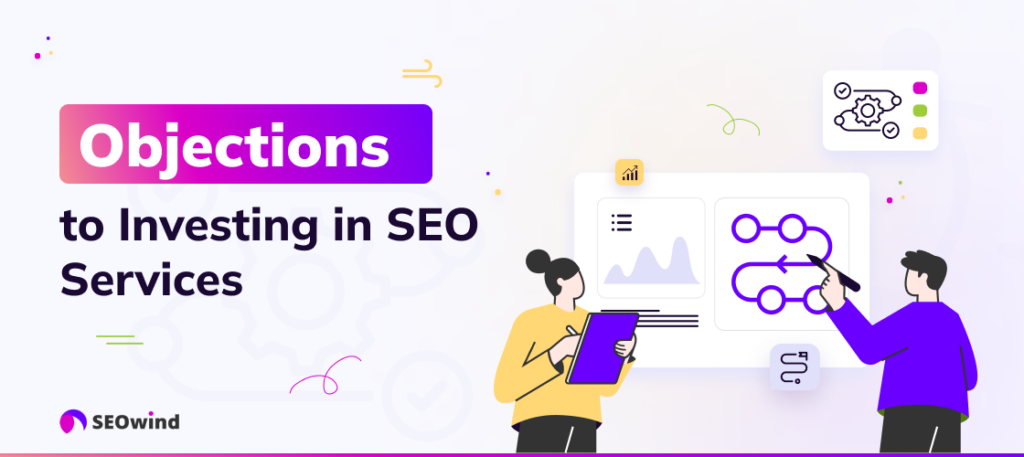
Taking the plunge and investing in SEO services is not a decision one should make lightly, especially when you factor in the many misconceptions surrounding it. Among the most significant objections to partaking in optimization strategies are the implementation expenses. And I understand the concern. After all, why devote precious resources to something as seemingly elusive as search engine rankings? Let’s address these concerns head-on:
Objection #1: SEO seems too expensive
How crucial can this service be if you repeatedly question whether SEO is too expensive? For any business owner or marketing professional grappling with such thoughts, it’s pivotal to understand what makes up these costs.
Let’s start by considering actual figures. According to an eye-opening study by Ahrefs, 78.2% of SEO professionals charge a monthly retainer fee for their services, and the most popular pricing tier for monthly retainers is $501–$1,000 per month. The most popular hourly rate for SEO professionals is within the $75–$100 range, with 24% of respondents charging this rate. At first glance, these numbers may strike some as exorbitant, leading to the conclusion that SEO services might not be worth it.
But here lies the crux of the matter – value vs cost. It’s important to remember that cheaper solutions often lead to lackluster results, which eventually could turn out to be far more costly for your enterprise than initially believed. According to the SEO Services Report, business owners who spent less than $500 per month on SEO services were indeed 75% more likely to be dissatisfied compared to those who invested at least $500 per month. This finding underscores a clear relationship between the amount spent on SEO services and client satisfaction levels. Specifically, the report found that clients spending over $500/month were 53.3% more likely to consider themselves “extremely satisfied” with their SEO services.
Objection #2: SEO results take too long
Another common sentiment is that businesses have to wait a lifetime before seeing tangible success. You’re investing business resources and naturally would like some semblance of speed to your returns.
Contrary to popular belief, research shows a contrasting picture. According to Semrush, seeing significant SEO effort results typically takes 4 to 12 months.
Regardless of the expenses, SEO gains are rarely immediate. Several factors contribute to this, such as industry competition and existing online authority. Patience is your ally, considering an average Google Page One ranking is about two years old!
The Evolution of Search Algorithms: Staying Ahead in 2024
As we journey deeper into the digital world, it’s essential to understand that search engine algorithms are not static entities. Indeed, they have been steadily evolving, presenting challenges and opportunities.
How Helpful Update Influences SEO in 2024?
The Google Helpful Content Update was first introduced in mid-2022. This update was designed to target content that appeared to have been primarily created for ranking well in search engines rather than to help or inform users (Source: Search Engine Land).
The update aimed to improve the quality of content that appears in Google’s search results by rewarding content that provides genuine value to users and penalizing content that does not.
Following its initial launch, Google continued to refine and update the Helpful Content system to better identify and promote helpful content across its search platform. One of the significant updates to this system occurred in September 2023. This update focused on improving the classifier used by Google to better understand and evaluate the helpfulness of content. It was part of Google’s ongoing efforts to ensure users receive high-quality, relevant, and useful content in their search results.
This new algorithm change prioritizes recognizing the value and delivering genuinely useful content rather than just factually correct information. Unlike prior algorithm tweaks, where relevance was mostly associated with keyword prominence and other technical factors like metadata or backlinks, “Helpful update” shifts the spotlight to content depth and helpfulness.
With “Helpful,” cutting through the clutter requires your pages to rank high on factual correctness and demonstrate substantial value for users decoding complex issues or needs. This means going above and beyond plain facts to break down intricate ideas simply, offer actionable insights, and curate lists – basically anything that makes consuming information easy, fun, and enriching!
Is DIY SEO a Viable Option? Pros, Cons, and Resources
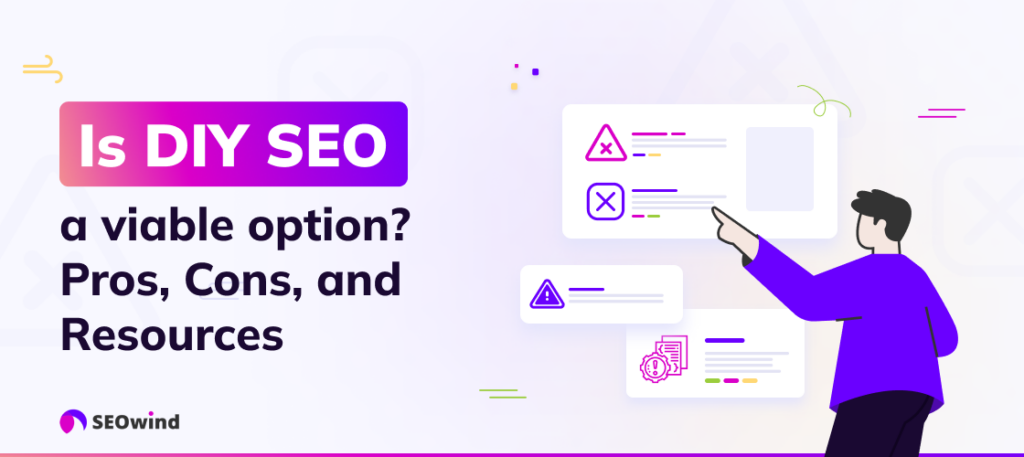
Many budding entrepreneurs initially consider venturing into SEO themselves before engaging with professional SEO agencies. Let’s investigate whether SEO works when it’s DIY. It’s essential to comprehend both advantages and stumbling blocks in this path.
Pros
Here are some positive aspects that come with managing your own SEO:
- Cost-saving: Handling SEO yourself means you don’t have to pay for professional services. This avenue may particularly benefit startups or small businesses on a tight budget.
- Acquiring new skills: Getting hands-on with SEO allows you to understand its intricacies better, explore various tools, and learn tactics to escalate website ranking.
- Personalized strategy: Having complete control over your strategies lets you mold them according to your specific goals and vision.
- Faster implementation: With no external waiting periods or consultations, implementing changes can be quicker when doing things firsthand.
However, just as every coin has two sides, the DIY approach has downsides that we need to review.
Cons
Here are the potential hurdles one might encounter:
- Steep learning curve: The intricacies of SEO demand time, commitment, and serious dedication to continuous learning due to rapid algorithm updates by search engines.
- Time-consuming process: Developing an effective campaign eats into valuable time that could otherwise be utilized elsewhere in business operations.
- Risk of negative impact: Without adequate experience, one may unknowingly perform black-hat practices that could damage site visibility and unnecessarily land you in shaky terrain.
- Delayed results: Doing SEO in-house can result in slow progress. Unlike professionals, who bring a refined approach and systems, beginners often face trials and errors.
After weighing the pros and cons, only you can gauge whether doing your own SEO is viable. Below, you can find some resources that might help you learn more about it.
Resources
- Google SEO Starter Guide: This beginner’s guide walks through different aspects of optimizing websites for search engines and sets a good foundation.
- Yoast’s SEO training courses: These offer more specific training on everything from understanding your audience to technical SEO approaches.
- MOZ Blog: A reliable and rich resource filled with easy-to-understand articles and in-depth content on various SEO topics.
- Neil Patel’s Marketing School Podcast: This platform offers daily bite-sized marketing episodes packed full of valuable takeaways regarding digital marketing, including SEO!
- SEMrush Academy: Offers extensive online certification courses and delves deep into diverse domains within the SEO landscape.
By using these resources and tireless determination, you can undoubtedly make strides on your path to mastering DIY SEO!
However, remember that striking the right balance between saving costs and achieving productive efficiency is pivotal.
When to Consider Hiring an Expert or Agency
Contrary to popular belief, deciding when to hire professional assistance isn’t merely about affordability. A lack of in-depth knowledge could be more costly in the long run than an upfront investment in experts.
When challenging technical SEO issues start hampering your site’s performance, it becomes critical to seek expertise. Perhaps algorithm updates have affected your website rankings, or backlinking strategies are no longer adequate for your expansive content architecture. These are telltale signs that you need expert intervention.
Moreover, a professional can provide insights from numerous projects they’ve handled, saving you time and avoiding potential pitfalls. It has been widely accepted within marketing circles that companies often receive exponential results when paying for search engine ranking expertise.
DIY SEO can serve you well if your objectives mostly revolve around learning basics and initially keeping costs low. However, hiring an expert or agency would ensure proficiency and effective outcomes when elaborate needs arise. Your voyage through the labyrinth of SEO largely depends on what suits your specific scenario best, so weigh the pros and cons well enough before deciding on your course.
Deciding If You Should Invest in Professional SEO Services
But is SEO really worth it? Well, there’s no better way to address this than by considering the prospect of investing in professional SEO services. After all, behind every successful website ranking on Google lies an effective SEO strategy implemented meticulously. Let’s journey through the process of making that critical investment decision.
Criteria for Choosing Reputable and Effective Service Providers
Choosing a service provider can sometimes feel like walking through a minefield. How do you dodge around poor-quality providers to find real experts? Here’s a guide for choosing ideal professionals:
- Experience: Look for those who have been a part of the SEO landscape for years. While shiny new agencies may seem attractive with their bold claims, longevity speaks volumes about success.
- Transparency: The best firms share their strategies openly instead of relying on cryptic “trade secrets”. These are the people whose work withstands scrutiny because they use white-hat techniques only.
- Case Studies and Credentials: Credible providers can provide case studies of businesses they’ve helped transform or verifiable credentials from reputable academies or certifying bodies.
- Solid Reputation: Check unbiased reviews from multiple sources (industry forums, social media, trade publications) before deciding on an agency.
- Adaptable Strategies: With search engine algorithms continually evolving, ensure your potential partner has shown adaptability in keeping client sites optimized despite changes.
By bearing these criteria in mind during your selection process, you’re well-placed to choose a partner that will effectively steer your business’ online visibility efforts toward tangible results.
House Efforts With Outsourced Expertise
If you’re wavering between fostering an in-house team or outsourcing expertise when managing your site’s SEO prowess, consider this: both have their advantages and unique challenges.
Developing and housing your own SEO team presents the advantage of deep brand familiarity. However, this approach demands ongoing training to keep up with fast-changing SEO trends. On the other hand, outsourcing tasks to specialized agencies might fetch you quick results since they have their fingers constantly on the pulse of online optimizations.
Before making that decision, assess your current resources (often beyond just financial) against what an external agency can offer regarding service breadth, additional tools, or sheer experience.
So, is SEO really worth it? Considering its capabilities to position your business front and center before internet patrons, I daresay it is! However, deciding who wields that baton is equally important.
Final Verdict: Is Investing in SEO Worth It?
So, you’ve traveled with me through the labyrinth of SEO, from its basics to its complexities. Nevertheless, the primary concern lingers – is investing in SEO worth it? I would say, undoubtedly, yes.
Considering the numerous authoritative sources and case studies I highlighted earlier, they all suggest one definitive conclusion: though challenging and demanding consistent efforts, SEO is a pivotal part of any business aiming for digital growth. However, it’s about more than just dollars returned on dollars invested. We must view SEO as a long-term strategic approach rather than a quick fix.
Now let’s answer why your investment will yield fruitful results:
- Organic Traffic: Immense chunks of web traffic are steered by notable search engines like Google and Bing. Robust SEO practices enhance the likelihood of these users finding you in their queries.
- Trust and Credibility: Good SEO implementation centers on fostering trust and credibility among potential consumers. This consequently boosts your brand reputation.
- Comparatively Cheaper: When compared to other online marketing strategies, such as Pay-Per-Click (PPC) or buying leads for an email marketing program, SEO offers better cost-effectiveness.
As evidence supports my claim that SEO is worth it, keep in mind that patience is essential when waiting for results. Significant ROI might not be instantaneous, but it will assuredly prove profitable over time.
I hope this journey has been enlightening and helpful to your quest to answer whether SEO is worth it. Always adjust your SEO approach proactively, in line with evolving algorithms, and keep in step with your business requirements.
FAQs Addressing Top Concerns Regarding SEO
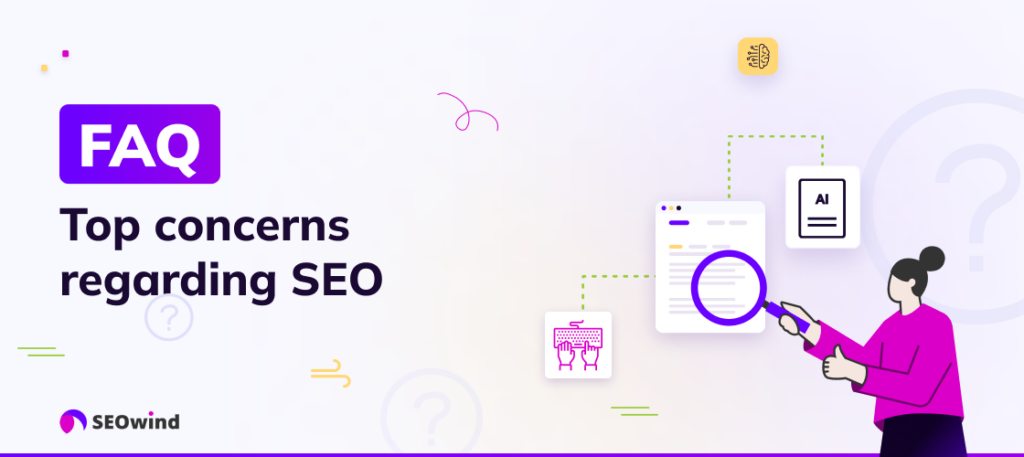
Now, let’s take a closer look at your frequently asked questions regarding SEO. Complex discussions often boil down to simple, recurring queries. I have collated some of them here for you.
Is SEO worth it for small businesses?
Absolutely! Here’s the thing about SEO: it does not care about the size of your business. Whether you operate on a local scale or have an international audience, SEO is a driving force behind online visibility. With strategic SEO, even bootstrapped startups can muscle their way into competitive search engine results pages (SERPs). Remember that good SEO practices help level out the field, enabling small businesses to compete with larger rivals in terms of organic search visibility.
Is it really necessary to do SEO?
Yes, it’s as essential in 2024 as it has ever been before! Competing for users’ attention in today’s digital landscape requires more than an elegant website. By optimizing web content based on suitable keywords and providing value to visitors, you considerably improve your chances of being found organically by potential customers looking for products or services like yours on search engines. Additionally, “Google” has become virtually synonymous with searching for anything online; neglecting SEO equates to willingly remaining invisible to most internet users.
Is paying for monthly SEO services really worth it?
Investing in professional monthly SEO services can be highly beneficial if you lack internal expertise or don’t have time to do this task effectively while running other aspects of your business. SEO agencies are equipped with updated knowledge, tools, and strategies that promptly handle algorithm changes and consumer behavior, positioning you better against competitors concerning SERP ranks. Moreover, consistent monitoring and adjustment over extended periods bolster long-term growth, something sporadic DIY efforts might miss out on.
Is SEO worth it? I’m not really sure what to expect.
To be frank, it isn’t magic. You won’t see overnight results; SEO is a marathon, not a sprint. However, the wait can be fruitful. Expect increased web traffic through improved visibility on search engines, which should result in higher lead generation and conversions (i.e., more business!). Furthermore, implementing good SEO techniques enhances user engagement and experience by guiding alterations that make your website content more relevant and easily accessible for visitors.
Is it worth learning SEO in 2024?
In an increasingly digitized world, knowing how search engines work and leveraging them to your advantage are highly prized skills. This expertise may play a vital role if you own a business, aspire to carve out space within the digital marketing field, or merely wish to create impactful online content as an influencer or blogger.
